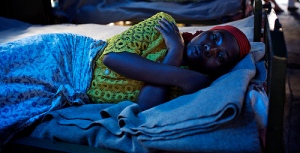I’ve worked as a Pennsylvania-certified sexual assault and domestic violence counselor since I was nineteen years old. I’ve counseled women as young as fifteen who have been assiduously cheated by the United States justice system, wandering through the remainder of their lives helpless and destroyed. I’ve witnessed the way sexual violence breaks a woman’s spirit. But I’ve only done work in the United States, where victims have access to free counseling services and medical attention. Across the globe, in war-ridden communities in the Democratic Republic of the Congo, women are forced to make do, to piece themselves back together and reintegrate back into society, without such resources.
In the Democratic Republic of the Congo, rape is an inescapable reality.
Policymakers in the Western world tremble in fury each time news of an honor killing or gang-rape in the Muslim world reaches their ears. Three years ago, when former Pakistani President Pervez Musharraf banned gang-rape victim Mukhtar Mai from leaving the country so she wouldn’t “blacken her country’s reputation,” Washington erupted in rage. Condoleezza Rice personally ordered the travel ban reversed. Mai was vindicated.
The U.S. government has taken similar actions in Saudi Arabia, and other Middle Eastern countries. But why have our policymakers not exercised the same resolve to aid women in the DRC, a country with the highest rate of sexual assault in the world? Up to 70 percent of Congolese women are estimated to have been raped at some point in their lives.
Stories of their ordeals are nothing short of horrifying. Many women are reported to have bullets shot into their vaginas, others raped by multiple soldiers. Still others are sexually assaulted using tree-branches and bayonets. Rape in the Congo has evolved into a war strategy, utilized by various rebel groups to force their enemies into submission.
Last fall, Vice-President-elect Joe Biden co-sponsored the International Violence Against Women Act, a bill that will provide one billion dollars over the course of five years in U.S. aid to international programs that deal with sexual violence.
Both President-elect Barack Obama and Vice President-elect Joe Biden have demonstrated their commitment to supporting the I-VAWA and providing aid to the women of the Democratic Republic of Congo. President-elect Barack Obama personally wrote a letter defending the legislation and rebutting a group’s claim that the I-VAWA is an example of anti-male, anti-family propaganda. He also wrote a letter to Condoleezza Rice, urging her to take action on behalf of the rape victims languishing in this central African country.
So, while it remains to be seen how the Obama team addresses violence against women in the DRC, perhaps there is hope. It would be a shame if our concern for victims of sexual assault and domestic violence continued only to extend to countries of geopolitical and strategic interest.


1 comment
Comments feed for this article
December 11, 2008 at 2:04 pm
Sarah Frazer
Great story Sahar! As you mention, Obama and Biden have been long-time champions of the International Violence Against Women Act. Sign the Petition to ask President End Rape in the Congo in honor of International Women’s Day this March 8, 2009.
Link to the petition
http://www.worldpulsemagazine.com/magazine/actions/sign-petition-to-end-rape-in-the-congo
Link to synopsis of situation in Goma and North Kivu, DRC http://www.worldpulse.com/pulsewire/exchange/actions/3660
Sarah